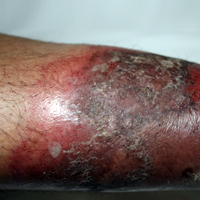 Psoriasis is the most common of all skin diseases affecting mankind with nearly 3-5% of the entire world population suffering with it. It appears as thickened scaly areas over elbows, knees and scalp. However, in severe cases it can spread to involve large parts of the body.
Psoriasis is the most common of all skin diseases affecting mankind with nearly 3-5% of the entire world population suffering with it. It appears as thickened scaly areas over elbows, knees and scalp. However, in severe cases it can spread to involve large parts of the body.
Recent evidence points towards a genetic cause for psoriasis. Stress tends to be the most common precipitator for the onset. The condition is seen more frequently in children of patients. It can appear at any age in one’s life. The condition can often be a reason for social and professional isolation leading to depression and failed relationships.
Psoriasis can also affect joints (psoriatic arthritis) in up to 25%of patients. Psoriatic arthritis can occur even without skin affection. Of late, psoriasis has been linked to coronary heart disease (heart attacks) and strokes.
Those affected by psoriasis do not like the appearance of the lesions that are itchy with powdery scales falling everywhere. These scales can be a source of infection to others especially the very young and old. The disease is not contagious.
Psoriasis exists in various forms like guttate psoriasis, scalp psoriasis, chronic plaque psoriasis, pustular psoriasis, nail psoriasis, psoriasis of palms and soles.
Treatment
The treatment of psoriasis is dependent on the extent and severity of the disease. Mild disease forms can be treated with topical applications of coal tar, calcipotriol, tacrolimus and steroids. More severe forms will need systemic therapies with methotrexate, ciclosporin, acitretin, Phototherapy and these days’ biologicals which have shown great promise. A combination of topical and systemic therapies works the best!!!
Often individuals with large areas of body affected are offered hospital admission for intensive topical therapy to clear them completely.

